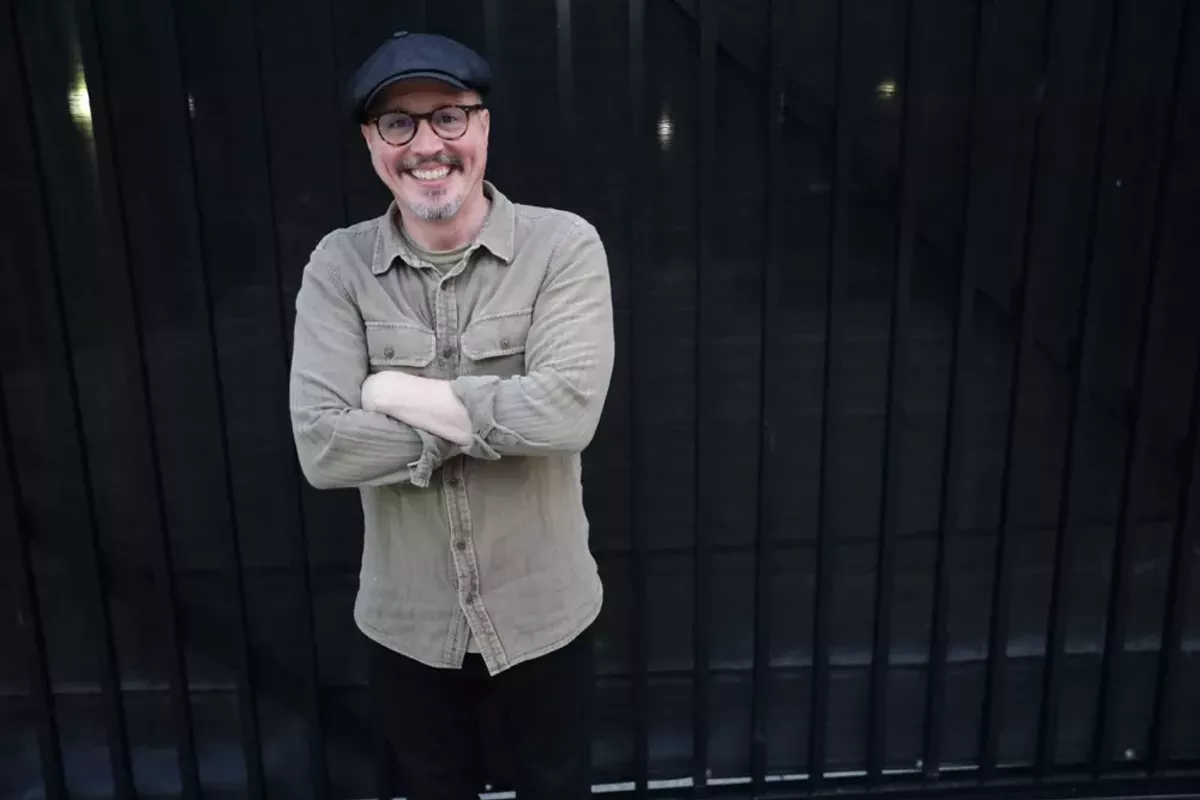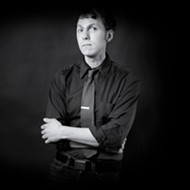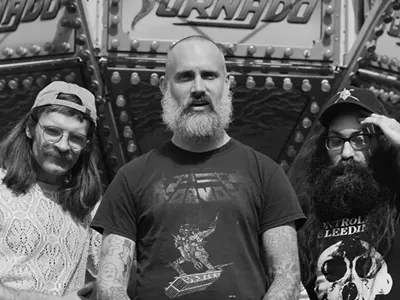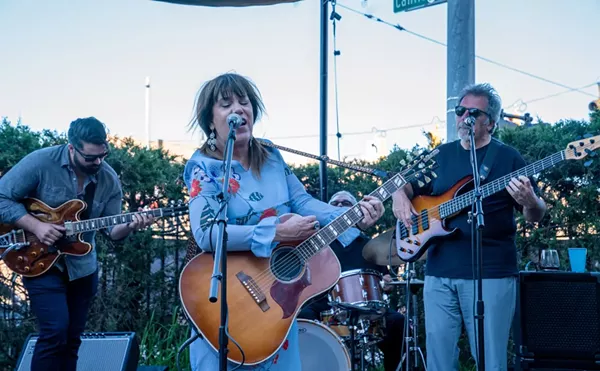

Audio By Carbonatix
[
{
"name": "GPT - Leaderboard - Inline - Content",
"component": "35519556",
"insertPoint": "5th",
"startingPoint": "3",
"requiredCountToDisplay": "3",
"maxInsertions": 100,
"adList": [
{
"adPreset": "LeaderboardInline"
}
]
}
]
Ryan Dillaha says it's never been difficult for him to get personal in a song. "But these," he says, nodding to the 11 tracks on his latest, Closer to Better, "get pretty heavy." He pauses. "There's a certain authenticity that I prize in that," he says, "considering that there are people who might need to hear this."
When you do hear the new album, you'll find Dillaha's rich, willowy warble poised outside of any finite genre borders, like the twang of Americana mingled with the tender dirges of the blues, or the violin-sweetened evening rollicks of country adjoining grittier protest balladry. And even then, there are some lighter-hearted waltzes and rustbelt lullabies breaking up some of the broodier stuff. Most of the songs were written over the last two years, but some go back to 2014; as a whole, Dillaha says, the songs are each aspiring to be "closer," in a sense, toward his ultimate goal of manifesting a singular narrative "cosmos" all his own.
His heroes include Townes Van Zandt, Guy Clark, Todd Snider, Tom Waits, and even Van Morrison. "They wrote out of a place of their own creation," says Dillaha, who was born and raised Downriver and spent a decade working in a steel plant in River Rouge. "I think how you create a universe where your own songs take place is one of the great mysteries of songwriting, making things like a straight-up labor song to a breakup song adhere, and be of the same utterance, like a novel," he says. "I got 'closer' to it on this one ... more than any other."
This is Dillaha's fourth album, but it's his third as a solo artist. He spent his 20s following in line with his father and grandfather, working in the Ford River Rouge Complex. But his life took a different path, primarily toward literature and expository writing, and he wound up a professor in the English Department at Oakland Community College. About 10 years ago, he started performing and writing his own songs, inspired by a cadre of blues and folk troubadours, but also mixing in a bit of the flair of hard-boiled noir authors like Denis Johnson, along with his own directly anecdotal or abstracted third-person narratives chronicling a universally relatable blue-collar life-work experience.
In July of 2011, collaborating with percussionist Tim Rios, Dillaha released his debut album, Love Alone, which, if we're splitting hairs categorically speaking, fit pretty securely in the country genre. That was followed up by Awful Blue, which wasn't necessarily "blues," but more so in the folk balladry tradition, with mesmerizing timbres threaded along drifting melodies with songs like "Michigan Weather" and "Work Rolls." Closer to Better is a mix of narrative that is more metaphor than biography, but there are still a lot of bruises revealed when he rolls up his proverbial sleeves on some of these songs. The production of Bunky Hunt (at the Whistle Pig Music Group) added delicate dashes of violin, clarinet, and cello.
"I gave up the reins," says Dillaha. "I really wanted someone to produce the record. I don't have a producer's ear — I can't hear what's not there. I just asked for veto power to say no to anything, and I only had to do that for one part. I was letting it go at the minutest of levels, but you can still keep your overall vision. But let it go at what these additional parts would be. And that allowed me to not think about what 'kind of song' this one or that one was."
In addition, Dillaha serves as the lead singer and songwriter for a rock 'n' roll-inclined ensemble of talented musicians known as the Miracle Men, which released its first album back in 2015, Miracles in Mono. "If someone listened to all of these albums in a row," Dillaha says, "I think the throughline would still be obvious. My songwriting influences haven't changed — that continues through all these records. But being in more of a rock 'n' roll band was keeping me into a certain kind of expression — most of the music I listen to is more poetic stuff. But I'm allowing songs to come out as they're coming to me. And I think the writing experience on this record has certainly opened up paths and showed me that I can do things that I hadn't done before."
Dillaha embraces the humility implicit in an album title like Closer to Better. It was also the first song he wrote for this album, and he says that the suggested arc of always aspiring toward improving, honing, and progressing stuck with him. "I keep getting closer, too, to the goal I want as a songwriter, that it is going along that path," he says. "I also think there are motifs so that it becomes more like a novel when (the songs) are assembled. And it certainly holds together thematically, because these were — and are — the thoughts I had or the person that I am while writing them."
Dillaha credits several of his contemporaries in the local music scene for providing him inspiration, particularly all the players who contributed to the record, but he said he would be especially remiss if he didn't comment on the bond he's had with a fellow poet and songwriter with a distinctly blue-collar upbringing, John Freeman (singer-songwriter, member of the Celtic folk ensemble the Codgers, and who also teaches at Oakland University), whose band, the Wagner Act, will be opening up for Dillaha's performance of the entire record, this Friday.
"(Freeman) is one of my closest companions through this songwriting journey," he says. "We started writing around the same time and playing open mics, and we both started getting bigger shows around the same time. ... He's one of my favorite poets, and we talk a lot. We talked heavily about (the aftermath of the 2016 election) because we always write songs that identify with the working class and we kind of felt like we had the rug pulled out from under us. But I wrote one song, 'All They Take,' as an insistence upon the one truth about the working class, is that we live these kinds of lives, we make things. Others consume things, but we make things — that's not changing."
Meanwhile, Dillaha says he has a few songs nearing completion for the Miracle Men, but that with a family and the teaching gig, he can't abide a scenario where he's trying to force anything too quickly. "I'm just glad to finish a song," he says. "Trying to put myself into writing a certain kind of song all the time is a fruitless effort. I have to leave myself open to what's coming. These 11 songs weren't culled from 30 others; they were culled from 12."
Dillaha's words carry considerably more weight and profundity on this new batch, but his vocal performance is affectingly tender, essentially to the extent that it evokes a lean toward healing — restrained but resolute. He's really got a beautiful voice if you haven't heard it yet, and it's especially shimmering, in a subtle way, on Closer to Better.
"It's all a matter of growing as a songwriter," he says. "Writing songs, and moving through these things by giving them a voice and melody is cathartic. But there is stuff on this record that is more deeply personal than anything I've written before." He admits, again, to an eagerness to complete a new Miracle Men record as soon as he can, but at the same time, he had all of these songs piling up — and he had to follow them through. "I can't choose what kind of artist I am," he says, nodding back at not fitting in any genre. "If I try to, then I'm no artist at all. I just let the songs come. It's certainly loosened up the notion of the romantic poet. And I do feel more capable, now, of going in different directions."
It seems like the optimal state of mind (and state of being) for any songwriter: to be always on the path, closer — as it were — to better.
Ryan Dillaha will perform an album-release show for Closer to Better on Friday, Dec. 13 at Ant Hall; 2320 Caniff Ave., Hamtramck; 313-365-4255; planetant.com. Doors at 8 p.m. Tickets are $13. The Wagner Act and Jackamo are also on the bill.
Get our top picks for the best events in Detroit every Thursday morning. Sign up for our events newsletter.






